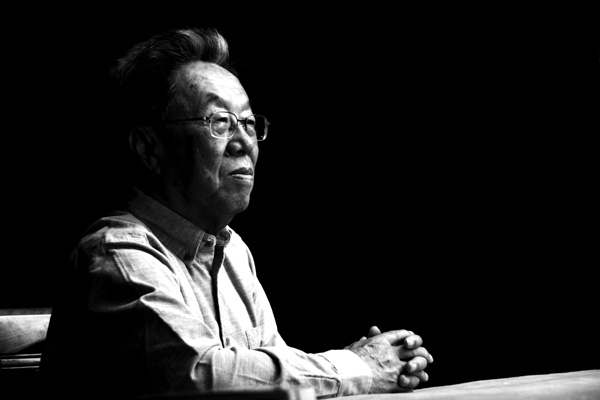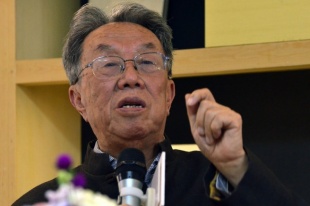Champion of culture


Veteran Chinese writer Wang Meng is honored for his contribution to Sino-Russian people-to-people ties, Mei Jia reports.
Veteran writer Wang Meng, also a former culture minister, is among 10 Chinese honored for their contribution to Sino-Russian people-to-people exchange.
The announcement was made during President Xi Jinping's state visit to Russia last week. The awards ceremony held in Moscow on Wednesday, was jointly hosted by Chinese newspaper Guangming Daily and Russian news agency TASS, with each side naming 10 awardees. China and Russia will mark the 70th anniversary of diplomatic ties this year.
Wang, 85, has forged close relations with Russia over the decades through culture and the arts.
He can recall not just the names of the many Russian artists whose works he enjoys, but also plot details of books since his first contact with Soviet-era art in 1945, when he was 11 years old.
At the time when Wang became a member of then underground Communist Party of China, he read a novel by Polish-Soviet political activist Vanda Vasilevskaya, and learned to sing the Russian song Katyusha. During a visit to Russia in more recent times, Wang says, his memory of musicians' names "surprised and impressed a Russian cultural official".
Wang moves quickly for his age, as noticed during an interview to China Daily at his apartment in Beijing that overlooks a big park.
Almost 40 years ago, Wang's works were already available in overseas markets.
In 1987, his novel Move-to-Turn into Human Forms was successful in the former Soviet Union. The first edition sold 100,000 copies and got many fans there. Besides, he has been promoting China-Russia cultural exchange for long.
"I am quite familiar with Russian culture and art, and I respect it and adore it," he says.
In 2003, Wang was given an honorary doctorate by the Institute of Far Eastern Studies under the Russian Academy of Sciences for "your reputation in China, your achievements in bringing Chinese culture and literature to a new level, and your social activities that promote mutual exchanges in culture", as the institute's letter to Wang says.
In 2016, Wang spoke as an international delegate at the Fifth St. Petersburg International Cultural Forum.
"I said there that cultural communication between the two countries has played a significant role in terms of the Chinese revolution, social reforms and developments in literature and culture," Wang says.
With his debut novel, Long Live Youth, in 1953, Wang launched his career as one of China's most prolific and important writers in the contemporary literary scene. And there's no sign of him running out of inspiration for stories. Wang has published new books recently. Two major recurring themes in many of his works-youth and revolution-are seen by critics as the reverberations of his absorption of Soviet and Russian literature and art.
Wang says he has watched Soviet movies such as The Fall of Berlin, directed by Mikheil Chiaureli, multiple times. He also requested for a rebroadcast on radio of Anton Chekov's stage plays that debuted in Beijing in 1955. Wang was told by a more experienced writer when he started his writing career with novels that a theme is crucial to long-form writing.
"I was puzzled until I got a chance to listen to a symphony by Dmitry Shostakovich," he says. "Then I understood what the theme is-a lingering thread in the work which has variations that are mutually connected."
What touched him the most, Wang says, is Leo Tolstoy's masterpieces Anna Karenina and Resurrection.





































